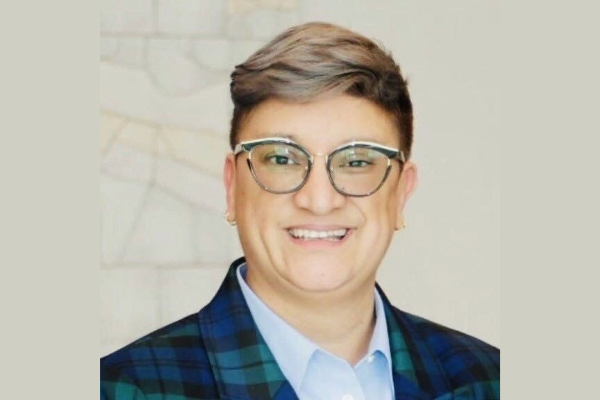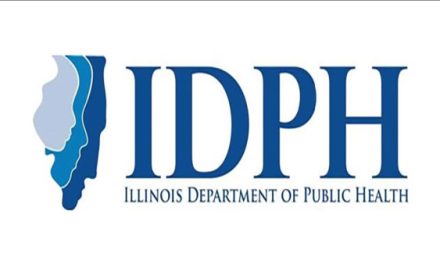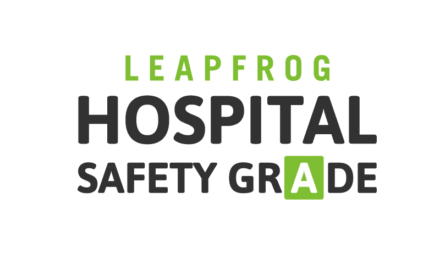
On the record with DHS Secretary Dulce Quintero

Department of Human Services Secretary Dulce Quintero said their expansive background has prepared them for their new role.
Quintero, who took over the agency in October, was born in Mexico to migrant farm workers and moved to Chicago when they were 9. They are the first non-binary person to lead a state agency.
“It’s a privilege and I’m very grateful for Gov. (JB) Pritzker to give me the opportunity, especially someone like me with some of my lived experiences as a migrant person,” Quintero said in a recent interview.
Along with serving as an assistant secretary at DHS, Quintero said their past work as director of operations for the Erie Humboldt Park Health Center in Chicago helped inform them of the importance of connecting with communities and ensuring they can access services like care coordination, case management and behavioral health.
Quintero also spoke to Health News Illinois about the agency’s efforts to address the migrant crisis in Chicago and improve the state’s mental health and developmental services.
Edited excerpts are below.
HNI: Health equity has been key for DHS and your sister agencies. What steps can DHS take to ensure care is being provided to all those who need it?
DQ: (Access to services and resources) is something that we’re thinking about. We think about it from an equity lens. Like the COVID response, there was a lot around having to think about who had access to vaccines, mental health, wellness counseling and food support. Through the COVID response, we were able to strategize and think inovatively in a way to leverage technology. We were able to launch 988. When I think about going into the gloomier months and winter, there is an opportunity to really communicate the importance for people to access this hotline to resources. A lot of times people are still learning about it. We also have access through (American Sign Language).
Through some of the equity lines, we’re thinking about areas that we need to be able to focus on. We’re doing a lot of the work in violence prevention across the state, which is also part of health and equity. A lot of times people don’t see violence as something around health and safety. So there is a lot more to come around that.
HNI: DHS has been working with Chicago leaders to help address the migrant crisis. What’s the latest?
DQ: We have a very close relationship with the city. We’re working closely with the mayor’s office and the city leadership to really identify where the city needs additional support. We are assisting with a lot of the wraparound services, case management and rental assistance. We are also working on a plan … There are about 4,000 people staying in police stations and also the O’Hare airport. So part of this is working with the city to identify where can we leverage additional resources.
It’s been now a year-and-a-half that we’ve been responding to this humanitarian crisis. On my second week as secretary of DHS, I actually went to the border. I was in Texas. I was able to visit different parts of the entry points, and we got to learn the level of the humanitarian crisis. The buses don’t stop. The buses continue to show up at the landing zone in Chicago.
We did talk to different leaders at the Texas border entry point. The governor has directly reached out to the federal government and requested federal resources. Right now, the fact is there’s no federal coordination. It’s really being left to the border to do their own coordination and send the buses only to a few cities.
We’ve been really working closely with (community-based organizations), Catholic Charities and many different community providers to provide additional resources to other asylum seekers and new arrivals. So it’s very robust.
HNI: DHS in recent years has taken steps to improve the state’s mental health and developmental services. How is that going? What is your role in this endeavor?
DQ: In March 2023, the governor’s office and DHS announced a transformation initiative to reshape the way the state approaches individuals with intellectual and developmental disabilities. This initiative is really to do a deeper investment in home- and community-based support. We continue to really work closely with community providers. But at the same time, we’re also working closely with our current staff. We did a safety summit with some of our staff leaders, and then also worked closely with hiring and keeping up with attrition. It is really important to make sure that we have the amount of staff that is needed. We have various teams that are working on different parts of this transformation project. My goal is to continue to make sure that we’re working towards that and maintaining part of our goals and plans from that.
We have been doing a lot of this at Choate (Mental Health and Developmental Center), but also working towards all our centers. This is why we have centralized leaders that are really involved. This is not something that is a decentralized effort of transformation. This is DHS-wide, and we are investing resources to ensure that we get to transformation. I will say more to come, but this is something that I am following closely as I’m in this role.
HNI: What are some of the near- and long-term initiatives you’d really like to focus on?
DQ: There are a lot. I’m working closely with the Home Illinois office, so everything around our homeless populations, and then also the reduction of firearm violence in Illinois. I’ve been spending time with our new assistant secretary, Quiwana Bell, who recently joined DHS. She has been doing a roadshow across the state. So I was able to join her to visit some community providers to really understand how investments are making a difference.
I love data. So a lot of it is really reviewing data and quality to see how are we with the investments and are they making a change with decreasing violence in communities.
Internally, it’s really figuring out a way to continue to streamline hiring. If we continue to have the number of vacancies, it will impact the entire operations of our work and the services. We are working closely to be able to really identify areas to expedite hiring, especially in critical front-line roles, to ensure that services are being met. We have a team working on busting bureaucracy. Where is it that we’re adding bottlenecks? Where is it that we are taking too long to be able to process something?









